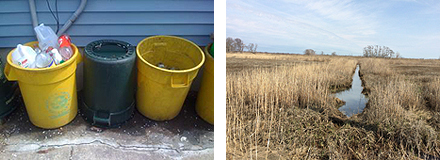Information for Residents
Watch a video about reducing mosquitoes in your yard »
Zika Information
From the Center for Vector Biology
From State of New Jersey Department of Health
From CDC
From WHO
American Society for Microbiology
Other mosquito-borne Diseases
Unlike Zika, these pathogens are transmitted in NJ and cases occur every year:
Recommendations for Residents
The type of mosquitoes and their impact on your daily activities will vary, depending on where you live in New Jersey. For instance, in heavily urbanized areas, residents will more likely be affected by pesky container breeders, while in coastal areas the salt marsh mosquito will be most prevalent and annoying.

Mosquitoes occur in a range of habitats.
No matter where you live, there are some general guidelines we can all follow to minimize the incidence of mosquitoes and our exposure to the diseases they transmit:
- If you need to control adult mosquitoes in your yard, do not apply insecticides yourself. Instead, in NJ contact your county mosquito control officials, other states’s residents should contact their state programs (which do not always exist). Mosquitoes have a long history of developing resistance to insecticides when applied incorrectly. Only a limited number of insecticides prove effective in mosquito control during disease outbreaks, therefore it is important that applications be made correctly by licensed mosquito control professionals with knowledge of the local mosquito populations and the necessary training to avoid the development of resistance.
- If you have standing water in your yard, you may apply insecticides yourself to control mosquitoes in the larval stage. Use products containing Bacillus thuringiensis (Bt) and always follow the directions on the label.
- Help county-wide mosquito control programs by facilitating access to or through your yard for suppression and extermination activities. Often, access to areas producing large numbers of mosquitoes is gained through private property.
- Organize or participate in clean-up activities to pick up garbage from parks and other public spaces. By helping to limit potential breeding grounds for mosquitoes, every resident can contribute to reducing the nuisance caused by mosquitoes and stop the transmission of vector-borne diseases.
- Share your knowledge with friends and neighbors! Mosquitoes don’t obey yard boundaries, so it is important to share your knowledge and work together to reduce mosquito problems in your neighborhood. Start by sharing this page on social media!
Rutgers' Role
Rutgers' role in mosquito control is directed through the Center for Vector Biology, which provides research and information to the residents of New Jersey about insects, including mosquitoes, and the diseases they carry and transmit. Rutgers works closely with the county mosquito control programs, which perform the vast majority of the applied suppression services for state residents. The Center also partners with New Jersey counties and state government, including the departments of Agriculture, Environmental Protection, and Health and Senior Services. Learn more about the various organizations involved with NJ mosquito control.
Visit the links above for more information about CVB efforts in each of these areas.

